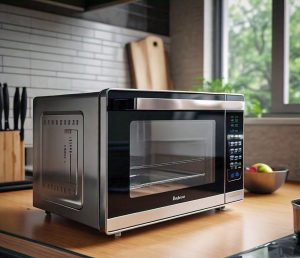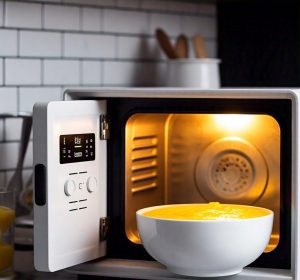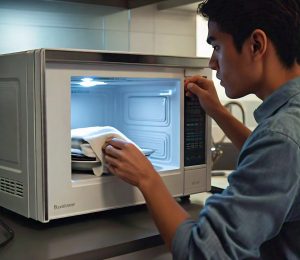A microwave is a kitchen appliance that uses electromagnetic waves to heat and cook food rapidly.
The question at hand is whether you can plug this device into any outlet in your home or not.
This article will include detailed information about microwaves, their power needs, the types of outlets they require, and other relevant factors affecting where you can plug these appliances in. We’ll discuss if plugging a microwave into any outlet is possible or safe, what are the potential dangers or impacts of doing so, and how to properly use an electrical outlet for a microwave. Additionally included will be handy tips related to using a microwave safely, FAQs on similar topics as well as our final say on the matter.
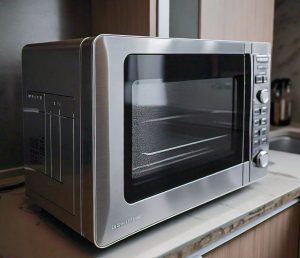
Jump To:
Can a Microwave Be Plugged into any Outlet?
Yes, a microwave can be plugged into any outlet as long as the voltage and current ratings of the outlet match the microwave’s requirements. However, it is recommended to use dedicated circuits for high-power appliances like microwaves to prevent circuit overload. Comparatively, other smaller appliances may not require such specific needs. So, while technically possible, certain precautions are advised when plugging in a microwave.
Check out if you can plug a microwave into a power strip.
Facts About Microwaves and Electrical Outlets
Here we will discuss the important things to note about microwaving and the use of electrical outlets.
- Voltage requirements: Microwaves typically require a 120-volt outlet, which is standard in most homes.
- Ampere rating: Most microwaves are designed for a 15-20 amp circuit. They can draw around 8 to 12 amps during operation.
- Dedicated circuit need: It’s recommended that microwaves have their own dedicated circuit to prevent overloading other appliances on the same circuit.
- GFCI outlets: Plugging a microwave into Ground Fault Circuit Interrupter (GFCI) outlets may cause it to trip frequently due to its power consumption.
In conclusion, although a microwave can technically be plugged into any outlet, there are certain guidelines for safety and efficiency that you should follow.
Check out if a microwave can be repaired.
Now we will discuss some other aspects of using microwaves safely and effectively.
What are the Alternatives to Microwaving?
If you can’t plug your microwave into an available outlet, there are several alternatives you could consider. You could use other cooking appliances such as conventional ovens or toaster ovens which may have different power requirements and plugs. Alternatively, you might choose to cook on a stovetop or grill if appropriate for your food item. Furthermore, some people may prefer using an electric kettle or slow cooker for certain dishes instead of a microwave. Lastly, another option would be utilizing portable heating devices like hot plates.
Check out if microwave can be used without a waveguard cover.
Tips for Microwaving Effectively
Here are a few tips for microwaving effectively:
- Always ensure that the microwave is in good working condition before use – check its wires and outlets regularly.
- To avoid uneven heating, stir or rotate your food at regular intervals during cooking.
- Microwave-safe containers should always be used when microwaving to prevent damage.
- Cover foods with a microwave-safe lid or wax paper to retain moisture and provide even cooking.
- Avoid putting metal objects in the microwave as it can cause sparks and potentially start a fire.
In conclusion, not all outlets are suitable for plugging in a microwave due to their power requirements.
We will now discuss related FAQs in our next section.
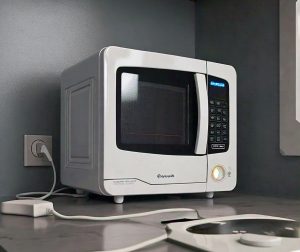
Frequently Asked Questions (FAQs)
Let’s now delve into the most commonly asked questions related to microwaving and heating.
Can a microwave be plugged into any outlet?
Absolutely, a microwave can generally be plugged into any standard household outlet. Nonetheless, it is highly recommended that your microwave oven be connected to a dedicated circuit breaker. This prevents overloading and potential electrical fires caused by high wattage usage, common in other appliances like ovens or stovetops.
Does heating duration impact the effectiveness of microwaves?
The duration of heating significantly influences the effectiveness of microwaves. For optimal heat distribution, food items should not be heated for extended periods at full power. Instead, use shorter intervals with pauses or lower power settings similar to convection ovens.
Can all types of containers be used inside a microwave?
No, not all types of containers are safe for use inside a microwave. Only those specifically labelled as microwave-safe should be used as they can withstand high temperatures without melting or releasing harmful compounds, unlike regular plastic containers which could pose risks when exposed to intense heat.
Is it safe to operate an empty microwave oven?
No, operating an empty microwave oven is unsafe and can lead to damage due to its design functionally comparable with other heating equipment like electric grills where the absence of anything absorbing their energy may cause harm to themselves.
We have addressed some frequently asked questions pertaining to microwaving and associated practices above.
Final Word
In conclusion, while using a microwave oven seems straightforward enough there are several considerations that need attention – from utilizing the correct outlet, adjusting heating duration for effective use, to selecting appropriate containers and ensuring never to operate it empty. Proper usage not only ensures food is heated evenly but can also extend the lifespan of your microwave oven.

